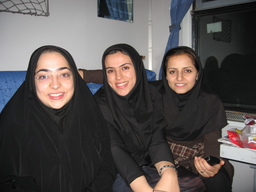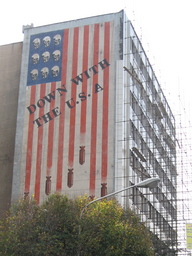
Arezoo, Mahnaz, & Haniya
 Arezoo, Mahnaz, & Haniya |
I'm wrapping up three days in Tehran. The homestay I thought I had lined up didn't work out, but I have seen some of the sights, met several people, and had some great extended conversations.
Rail and bus fares in this part of the world don't cost much, but I have been tempted to pick up air tickets for some of the legs of this trip. Domestic airfares in countries such as Iran and Turkmenistan are cheap. Flights within Turkmenistan are so heavily subsidized that most fares run between $1 and $2 USD for locals. Foreigners pay more--about ten times the local price--but that is still a bargain. Airfares aren't quite that low here in Iran, but they are cheap as well. Regardless, I'm trying to keep this an overland trip all the way to London.
Keeping on the ground from Mashhad to Tehran was no hardship. Clean, comfortable, quick, and with a decent dining car, the overnight train was a bargain. A first-class ticket cost 102,000 Iranian rials: just under $11 U.S. for a twelve-hour journey. On the train, I shared my train cabin with four women: all but one of them students at Tehran University. When the first two came aboard in Mashhad and sat on the berth across from mine, I wasn't sure what to do. Would it be okay to say hello? In Iran today all women are obliged to cover themselves up from head to toe--only faces and hands remain visible. I assumed that it might be impolite--rude, even--to strike up conversation, being a foreign man. That assumption was completely wrong.
We wound up spending the entire evening chatting away, a long, open talk that touched on all those topics that are understood to be best avoided in general conversation: politics, religion, and, what-do-you-really-think-about-wearing-all-those-garments?
I was surprised not only by how open they were to chatting with a non-Muslim man, but how well two of them--Arezoo and Mahnaz--could speak English. I've spent so many of my adult years exploring various languages of the world, but their level of English was far superior to what I can say in any second language. I felt sheepish, reflecting that they were scarcely born back when I started studying languages at university, yet they could express themselves so articulately.
As to the headscarves and big black sheets, they all expressed comfort wearing them. "It's just formal wear for us, what we put on in certain situations," Mahnaz elaborated. While she didn't make the analogy herself, I got the sense that what she wore in public felt as normal to her as it would feel for a man in the west to wear a necktie to the office, but not at home around the house.
I told them that it's easy coming from an American perspective to see women separated out, shrouded in layers of black, then presume that it is men controlling and repressing them. "You want to see repressed women, go to Saudi Arabia," Mahnaz replied. "Women there can't even drive cars."
"And men there can take on additional wives," Arezoo chimed in.
"Yeah, but doesn't the Koran say that men anywhere can have four wives?" I asked, genuinely curious.
Mahnaz laid it out: "It's like this: First, nobody would do that here in Iran, anyway. Second, if a man really wants to take another wife, he has to okay it first with the previous wife or wives. If they don't agree, it can't happen. That's not how it is in Saudi Arabia."
Convincing as their arguments seemed, there are official morality police across Iran, one of their duties is enforcing proper standards of dress. I don't doubt that many women here do feel perfectly natural wrapping themselves up, but wonder to what degree that would continue on if there were suddenly a change to a less conservative government.
Upon reaching Tehran railway station we parted ways. I found a decent hotel in the southern end of the city, not far from Emam Khomeni Square.
I spent my first couple days around town orienting myself, strolling about the city, taking in a couple of museums. The National Museum of Iran was smaller than I'd expected, but had a great collection: statues and relics from Persepolis, lots of tablets carved with cuneiform. Getting that taste of history at the National Museum got me excited for my stops further south, I should visit Persepolis myself in about a week.
The museum I was most keen on visiting--the Islamic Arts Museum--was closed for renovation, so I took a chance on the nearby Glass and Ceramics Museum. It wasn't the type of collection that intrigued me. I think the highlight of my visit was seeing the typo on a tag describing a piece. I'm sure that what it meant to say was, "Glass Bowl - Molded, 1st - 3rd Century A.D.". Whoever typed the description up apparently did not know that there is no letter e required between the w and l of "bowl".
I also found some great bookstores along Enghelhab Avenue, near Tehran U. One shop, Farhangsaray Sabs, had a nice collection of art books and materials on its second level. They sold calligraphy pens carved from reeds, they also carried several nice instruction manuals for different scripts. I didn't buy anything that evening, but want to make a return visit when I pass back through Tehran, picking up some pens and a particular title detailing how to write out the thuluth script.

|
From the teahouse we took a cab into central Tehran, to the location of the compound that once housed the U.S. Embassy. The exterior walls have been repainted with all manner of anti-American murals: a Statue of Liberty with a skull where her face should be, sickly-looking eagles fluttering above slogans ending in exclamation points.
A few blocks northwest of the former embassy we visited another teahouse, this one indoors and nicely decorated. In Iran, teahouses--chaikhana--probably serve up more hookahs than tea. This time we each smoked a bowl of apple-flavored tobacco, snacked on fresh pistachios and dates, and chatted. I asked Arya questions about travel to the destinations further south I plan to move on to, and general questions about life in Iran today. The other clientele at the teahouse were mostly young Tehranis, among them a fair number of fashionably-dressed women. Some of the women also smoked hookahs, though more smoked slender, brown cigarettes. Dress code for women seemed to be blue jeans and headscarf--a far cry from the great black sheets I saw back in Mashhad.
I'm hoping to meet up with Arya again when I pass back through Tehran in early November. This afternoon I move along, taking a bus down to Esfahan. Esfahan is one of the main cities I've wanted to visit in Iran, namely for its Islamic architecture and teahouses. I'll spend time in Shiraz and Persepolis, then visit Yazd on my way back up to Tehran. After that... I'm trying to figure my onward travel.
I can stay in Iran until November 8 on my present visa, but I've heard it's not a problem to extend time in the country, tagging on a couple more weeks with a visit to the right goverment office. An old friend from Seattle, Leah, will be spending three weeks working in Armenia, from late November to mid-December. She knows Armenia well, so would be the perfect person to visit. I might extend my Iran visa and cross the Iranian/Armenian border directly. Or, I might leave on the last day of my visa's validity, crossing into Azerbaijan, spending two weeks between that country and Georgia before meeting Leah. Or, I might spend an entire month in Turkey, then loop back to Armenia.
So many options, I really should get in touch with Leah and see what will work best for her schedule.
Farhangsaray Sabs Bookstore 1476 Enghelab Avenue, Tehran +98 (21) 6695-1762
Chaikhana Vasfra Khana Senti Intersection of Karim Khan-e Zand St. and Nejatollahi St., Tehran +98 (21) 8890-5567